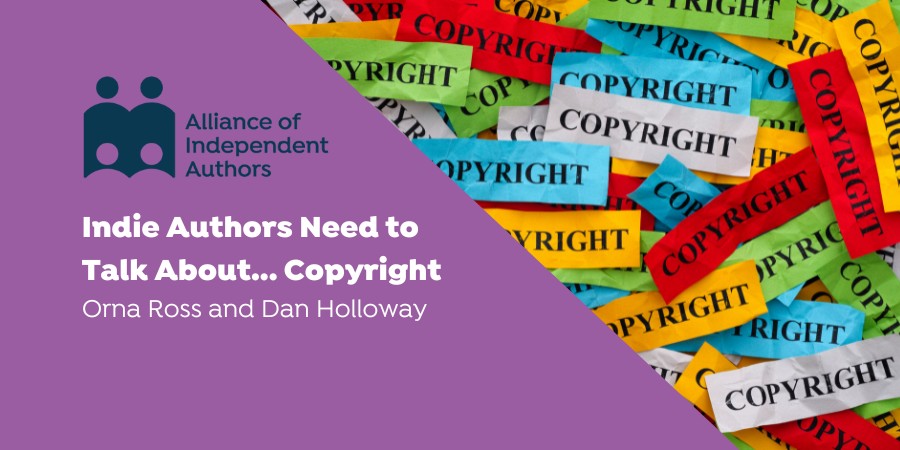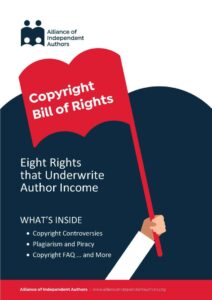The indie author's ability to make a living from writing books rests on the concept and laws of copyright. And indie authors can get very heated when they feel that right is being violated, whether by another person, or a machine. Is copyright broken in the digital age? Should we ditch it and start again. Today, the Alliance of Independent Authors AskALLi team begins with a new first series article. Orna Ross and Dan Holloway give us their opinions and tell us why indie authors need to talk about… copyright.
All About “Indie Authors Need to Talk About…”
Much of the Alliance of Independent Authors‘s output is advice– policies, codes of standards, best practices and practical information– but there’s also a huge need to challenge the status quo, to ask: why do we do this? Is there a better way?
The self-publishing community is a broad church, and not every author agrees about every subject. That’s exactly as it should be. We are all self-starters and we understand that passionate views can spark powerful discussions and drive our community forward.
That’s why we’ve started a new opinion column, called “Indie Authors Need to Talk About…”
We'll be bringing you bold, deeply reasoned, and original thinking that asks you to consider things from alternative points of view. Maybe you think reader magnets are a waste of time or you deliberately court piracy? Perhaps you think social media should be banned or KU is the worst thing that ever happened to authors?
If you're an ALLi member with a unique view, which you can back with reflective analysis, pitch us with your idea at [email protected].
 Orna Ross: Copyright is About Readers' Rights Too
Orna Ross: Copyright is About Readers' Rights Too
Indie authors often get very exercised about copyright. But the legislators behind copyright worked long and hard on the question of who should benefit most from works of the mind–the work's creator, or society at large?
Traditionally, organizations representing writers and artists come down hard in favor of the creator. Creators must be paid for their work and copyright is the mechanism by which we ensure that they are.
On the other side are those who believe that by granting an author, or a large corporation such as Disney exclusive rights to a work for a very long time, copyright law is limiting the free flow of information, education, and inspiration.
Conflicts between these two interest groups often see legal cases with creators and content companies like Hollywood on one side acting against readers, pirates, Silicon Valley, and open-access advocates on the other.
Authors and Readers
When it comes to books, copyright’s tug of interest has traditionally been triangular: between author, publisher, and reader. For the independent author, it’s simpler: between author and reader.
Authors want copyright to deliver the rewards everyone wants from hard work: appropriate remuneration and recognition. Readers want easy and reasonably priced access to good content.
The copyright industries, with the support of some powerful authors’ organizations, argue, in the words of the UK Society of Authors (SoA), that:
…sharing illegal copies for free online means publishers lose out on sales and authors lose out on royalties. It also leads to a decline in the perceived value of a book.
UK Society of Authors “Where We Stand”
For these copyright activists, file sharing is theft. As SoA Chair and world-renowned trade-published author, Philip Pullman, put it: “… as surely as reaching into someone’s pocket and taking their wallet is theft.”
On the opposite side to the authors’ interest organizations is the “copy left”, or “free culture movement”, a diverse group of activists, artists, lawyers and scholars who sees copyright as a threat to open access and file sharing, and the wave of knowledge and innovation thereby unleashed.
They question the wisdom of trying to impose a twentieth-century exclusive-rights copyright regime on the digital landscape of the twenty-first century. They fear excessive legal restrictions will endanger many invaluable knowledge and entertainment initiatives, from crowdsourced, “read-write websites” like Wikipedia, to authors writing within another author’s fictional world. They also quote significant evidence that piracy, counter-intuitively, does not actually have a derogatory effect on author income.
Between these two polarized positions sits the independent author.
Writers are also Readers
The experience of the self-publishing author introduces much needed nuance into the debate and shows clearly that pitting author against “user” is an oversimplification that ignores how we buy, borrow, read and write books in the digital age.
For a start, authors are not simply creators in need of recompense and protection. We are also readers, researchers, scholars, and citizens seeking education, imaginative stimulation and inspiration.
Digital publishing has moved us from a scarcity model around books to an abundance model. Generative AI moves us into a world where words are easily produced than ever before.
The biggest danger to authors today is not copying but obscurity. You can write a great book, but in the midst of all the great work out there, how is your reader going to find you?
Within the self-publishing community itself, indie authors take many different approaches and hold widely varying opinions about copyright issues like piracy, plagiarism and digital rights management. But copyright laws or vested “authors’ interest” lobbies that fail to acknowledge the impact of AI, the abundance economy for books, and the need for copyright to protect readers' rights, fail writers too.
Legislation that focusses heavily on authors’ rights, without an understanding of the symbiotic relationship between author and reader, without a realistic assessment of how books and their associated products are discovered, bought, read and promoted today, without an understanding of how today’s most entrepreneurial creators work and trade and negotiate harms more authors and readers than it helps.
A healthy, supportive, and functioning global copyright environment balances the benefits of ownership with the flexibility we need to run a successful and sustainable business.
For more see the Alliance of Independent Authors handbook: Copyright Bill of Rights: Eight Rights that Underwrite Author Income.
Dan Holloway: Copyright serves a noble end, but in a less than noble way
 Copyright is a white hot button right now. Creatives are seeking to protect their copyrighted material from the all-scraping eye of machine learning. In March, Protect the Creative Economy, a taskforce of writers’ and publishers’ groups, launched in the US to uphold the Copyright Act in the face of what it sees as an existential attack by state legislatures, seeking to force creatives to make works available on coerced terms to libraries.
Copyright is a white hot button right now. Creatives are seeking to protect their copyrighted material from the all-scraping eye of machine learning. In March, Protect the Creative Economy, a taskforce of writers’ and publishers’ groups, launched in the US to uphold the Copyright Act in the face of what it sees as an existential attack by state legislatures, seeking to force creatives to make works available on coerced terms to libraries.
Even more recently, writers’ groups celebrated a ruling against the Internet Archive’s Open Library for copying print books and lending them digitally.
So what is it about copyright that exercises writers and publishers so much that we have begun an all-out war on libraries?
Sharing or Theft?
I first became aware of copyright as a controversial topic a long time ago, when I saw a Federation Against Copyright Theft infomercial at the start of a video rented from my local Blockbuster.
For more than two decades since, the internet has sharpened the controversy. File-sharing platforms like Napster or Pirate Bay effectively criminalised half a generation.
That set the tone of the debate.
Napster’s co-founders were the first in a line of young white dudes to position themselves as the James Deans of the internet age. And anyone who cared about something as antiquated as copyright was the object of ire and ridicule.
Behind the posturing, serious lines were being drawn, but what interests me is not the differences but the similarity between the two sides. Both sides claim they are on the side of creativity and creators. Both sides claim the other is the enemy of those two things. And neither seems to countenance that the other might have a sincere concern for the same things.
I recognise that the argument is full of nuance. And that people with whom I disagree strongly share my passion for creativity, for art, and for ensuring that those who enrich our lives are able to do so without having their bandwidth eaten by financial hardship.
Open Access
Let me put my cards on the table. I’m a firm believer in open access in the very widest sense – making “the whole sum of human knowledge available to everyone with an internet connection”. Like others who think on similar lines, I take this position because I believe creativity matters, not because I believe it doesn’t. I believe it matters so much that the freedom to be creative cannot be allowed to rely on something so fragile as the protection afforded by copyright.
Because copyright is, fundamentally, a means to ensure payment. So to place copyright on a pedestal is to make the freedom to be creative, depend on the ability to secure payment for the product (word used advisedly) of that creativity.
There are many arguments I would put forward for why we cannot make the freedom to create so tenuous and delicate. But because space is short, instead I want to shine a gentle spotlight on the implications of positioning copyright too centrally.
Let’s return to libraries and AI. They both illustrate the same point – that the copyright defenders have a narrow view of creativity and a narrow view of which creators should be paid. I argue that narrowness runs counter to the democratising spirit of the indie movement.
Copyright and AI
Copyright, in the context of AI, ensures that creators get paid. But only those creators whose work is deemed to have “value” by “the market.” The problem is that value was determined by a world in which “the market” was made up of readers who wanted a particular thing (a good read).
AI programmes don’t value that thing. They are the ultimate voracious readers. They read everything put in their path, and extract, in a way, equal value from each word. The “added value” of any formulation of words for an AI would lie in its being able to plug gaps.
Gaps in its representativeness of the population it seeks to mimic. Or stylistic gaps that will make its presentation more interesting.
So I am not sure on what grounds creatives are arguing their words have a value in this context that other (equally sought-after) words don’t have. That feels a bit gatekeepy. Either AI is a different market – in which case shouldn’t it have different norms?
Or it has uncovered something about copyright that suggests a rethink is in order.
Copyright and Libraries
Then there are libraries. The argument here is that copyright protects a rights holder’s ability to decide where to sell their work, for how much, and in which format. Creators argue that no one else should set the terms of sale (making them sell books cheaper than they believe is reasonable).
And in the context of the Open Library’s actions, they argue that physical and e-book rights are two different sets of rights. The purchase of one doesn’t imply the purchase of the other – so printing out your e-book or digitizing your print book are not permitted by a single-format sale.
I don’t expect to win converts by explaining why I support Open Library. The very fact I do so creates horror in many of my fellow writers, who are often unwilling to accord me the good intentions I hope I offer them.
Yet many people who criticise digital libraries for making e-books available without the appropriate permissions are at the same time vehement supporters of Little Free Libraries. I don’t understand that.
Little Free Libraries are the small cabinets and repurposed street furniture where you will stumble across books that have been donated. You can take one and replace it with one you no longer need. They are, as their supporters claim, a really fabulous thing. They don’t pay creators a penny. And no one cares.
Is the reason so many writers love Little Free Libraries and hate PDF-sharing libraries the scale of lending? That doesn't make sense as Open Library only lends a book once at a time.
Might it be that we think the people who use Little Free Libraries are fundamentally “like us” whereas people who use the Open Library aren’t people we relate to so much?
I wonder if there might be a better way for creators to create without financial fear, instead of using a system that keeps their words away from many readers and places an inherent value on some forms of expression more than others.
Copyright serves a noble end, but I believe it no longer works for that end in a way that is noble. Whatever replaces it should serve that same end, and do so better.
Dan Holloway is the ALLi news editor. He writes poetry, non-fiction, thrillers and literary fiction. Find out more at rogueinterrobang.com and tweet him at @agnieszkasshoes


 Orna Ross: Copyright is About Readers' Rights Too
Orna Ross: Copyright is About Readers' Rights Too



Watch your favorite Movies, TV Shows, Web Series, Sports, and Anime on BeeTV for free. You can use it on your Android, iOS, Firestick, PC, and Smart TV. It is one of the best alternatives to Netflix which provides premium content for free.
One of the biggest challenges for indie authors in the digital age is copyright infringement. It’s easy for people to download and share pirated copies of books online, and this can have a devastating impact on authors’ earnings.